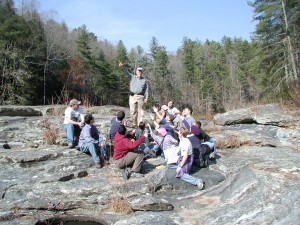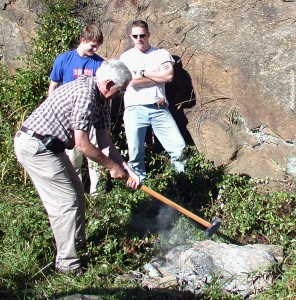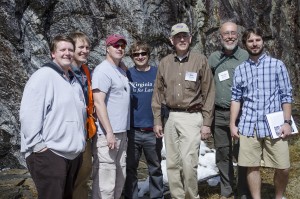Guiding Philosophy

RDH lecturing at Woodall Shoals, GA-SC.
My goal in working with M.S. and Ph.D. students is not to produce clones of myself, but to encourage students to think critically and independently; to learn to work with complex, frequently incomplete multidisciplinary data sets; to make sound and carefully thought-out scientific judgments based on data, with formulation of a range of hypotheses to explain the data; and to assume professional leadership roles whenever opportunities arise. The diversity of professional employment and success of my former graduate students may indicate that I have been partially successful in implementing this philosophy. Another note: while the majority of my M.S. students go on to work toward the Ph.D., there is no perceivable difference in the success of former students who choose to remain in our group or to go to another university for the Ph.D.
Mentoring Strategy

RDH showing grad students how to collect a hand sample on a field trip.
My strategy for working with graduate students is relatively simple: all are encouraged to work as independently as possible, but those who need direction daily, weekly, . . . receive direction. Graduate students usually need considerable help at the beginning of a research project, and receive help, particularly those who have not done intensive, professional level field research before (field camp does not suffice, but it is helpful preparation). We discuss options for research problems to find a project that is of mutual interest to a student and myself, and one that will be challenging with likely possibilities for publication. We define a project, formulate multiple working hypotheses, and set specific goals for the project. We then formulate a “contract” that says, once we define a research project, neither the student or myself will change the basic goals or expectations or amount of work to be done for the project unless there are surprises along the way or extenuating circumstances that demand changes (surprises are what make scientific research fun and challenging). The goal is to raise critical and independent thinking skills to a new level to be able to complete a research project at the M.S. or Ph.D. level. Completion of the M.S. should mean that a student will be a competent professional capable of entering our profession and having the foundation for a successful career with a variety of job opportunities. Completion of the Ph.D. requires the student to reach a new level of independent critical thinking as a scientist to be considered a colleague, rather than a student.
Regardless of where an M.S. or Ph.D. graduate becomes employed, a large part of their success hinges on their ability to communicate both orally and in writing. Part of the learning process involves being able to make high quality presentations at professional meetings and communicate in writing. Both my M.S. and Ph.D. students make presentations at professional meetings, usually in their second year, when they have accumulated sufficient data in their research to begin to draw conclusions from the data. Ph.D. students are required by our department to publish a paper in a refereed journal before being accepted to candidacy for the degree, a requirement that I encouraged the department to adopt when I came to UTK. Dissertations are constructed so that each chapter is written as a paper to be submitted to a major journal for review and publication, either before the dissertation is defended or soon thereafter.
Current M.S. Students
| Undergraduate Degree | Thesis Topic | |
| Trent Walker | University of Tennessee–Knoxville (two degrees) | Detailed geologic mapping of the Parksville 7.5-minute quadrangle and the kinematics of emplacement of large horses along a major thrust fault, southeastern Tennessee |
| Vade Scruggs
(Degree awarded 2016) |
University of Tennessee–Knoxville | Tectonics of part of the Cumberland Plateau in Tennessee: Data from detailed geologic mapping and subsurface wells |
| Mary Biswal
(Degree awarded 2016) |
St. Xavier’s College, Mumbai, India | Late Tertiary tectonic uplift in the southern and central Appalachians |
Current Ph.D. Students
| Undergraduate Degree | MS Degree | Dissertation Topic | |
| Jake Glasbrenner | Mansfield University, PA | None | Chronology and field relationships of paleoseismic features exposed in part of the East Tennessee seismic zone |

Some current and former students with RDH at a field trip stop in 2014.
Former Postdoctoral Research Associates
| Ph.D. Institution | Dates | |
| Jonathan C. Evenick | University of Tennessee–Knoxville | 2006–2007 |
| Peter J. Lemiszki | University of Tennessee–Knoxville | 1998–1999 |
| Joseph H. Allen | University of Kentucky | 1996–1997 |
| Angang Liu | University of Tennessee–Knoxville | 1992–1993 |
| James O. Eckert, Jr. | Texas A & M University | 1992–1993 |
| John R. Tabor | University of Minnesota | 1989–1991 |
| Steven H. Edelman | University of California–Davis | 1985–1989 |